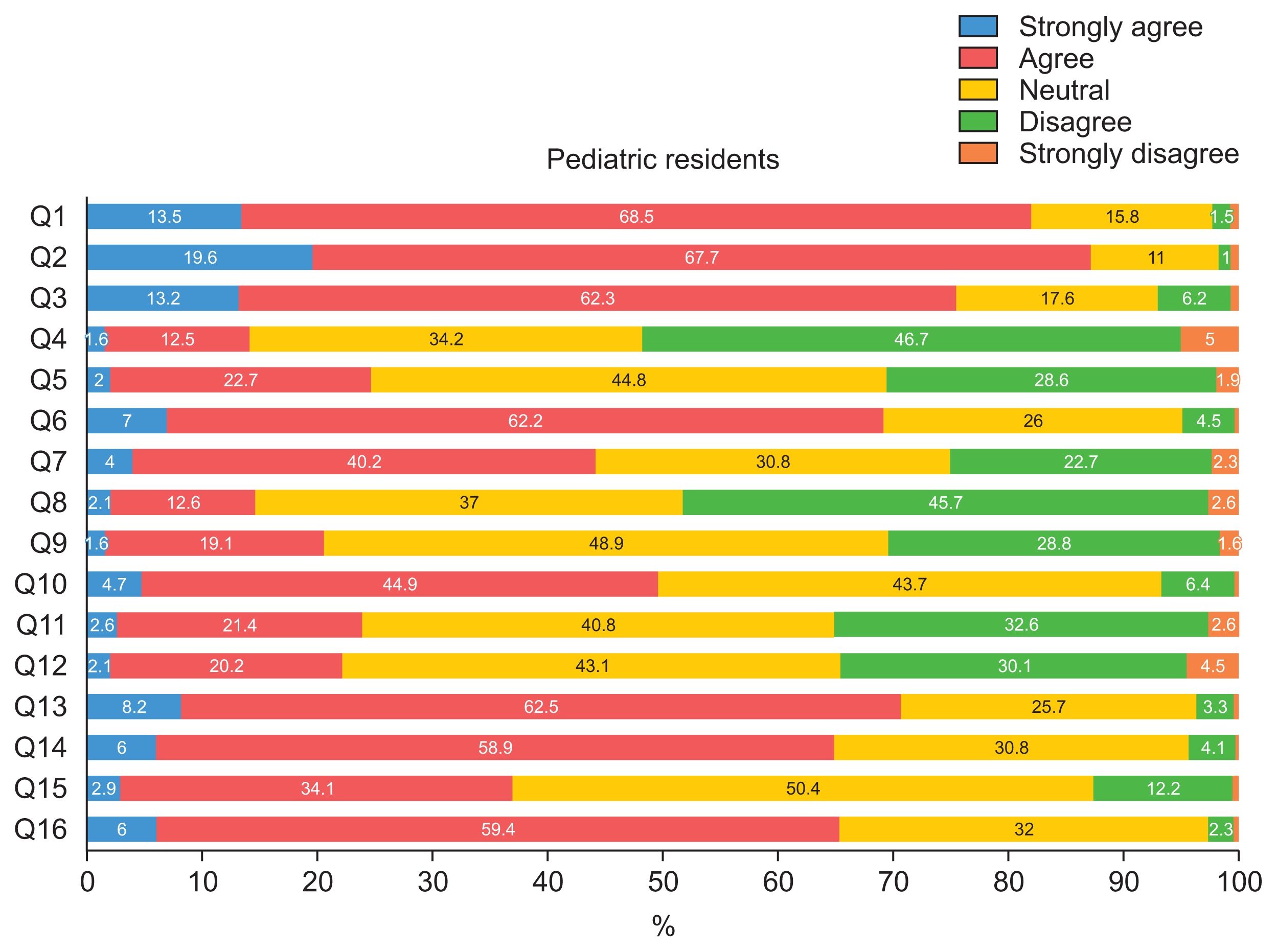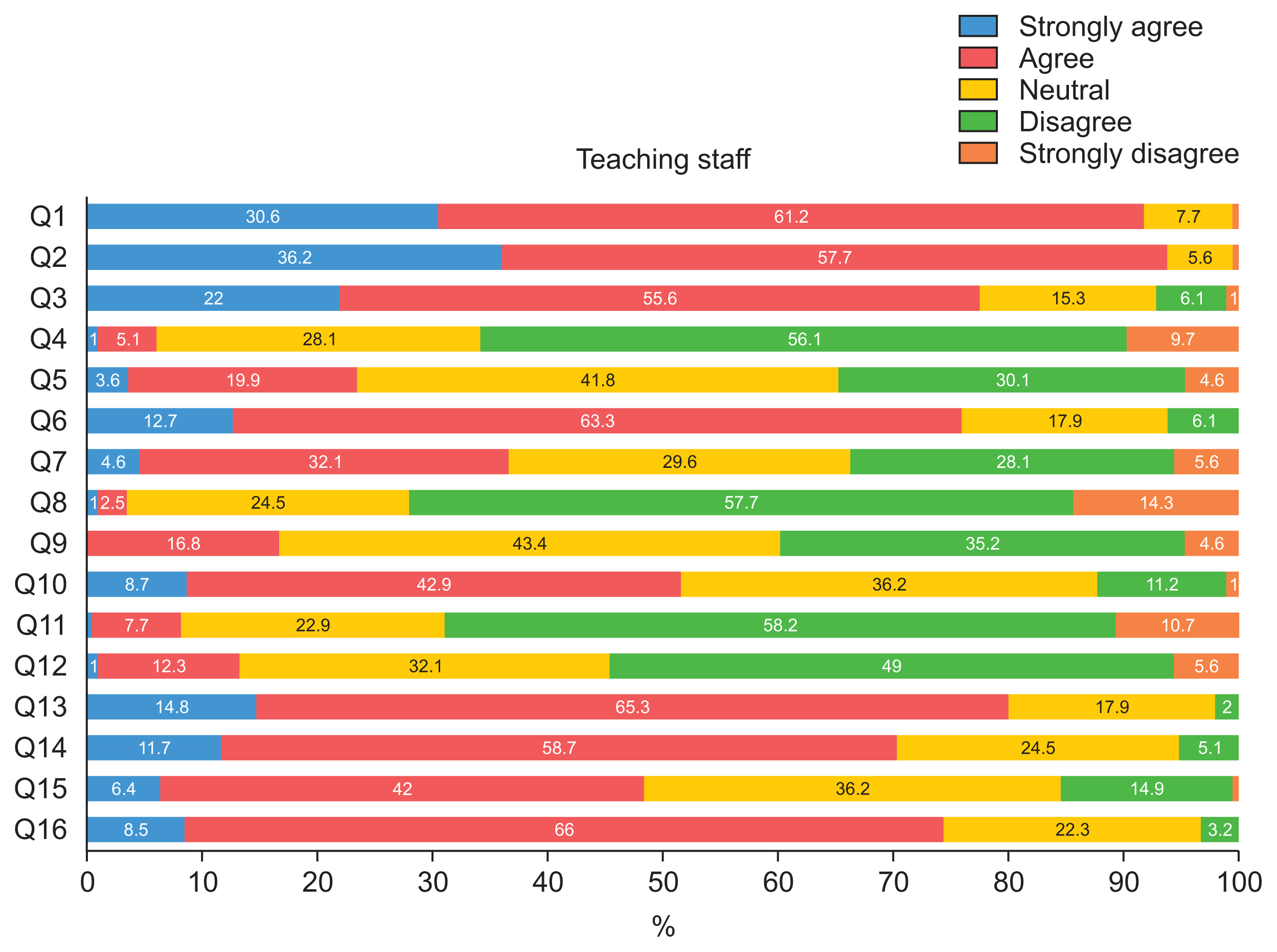Healthc Inform Res.
2024 Jul;30(3):244-252. 10.4258/hir.2024.30.3.244.
Integration of Artificial Intelligence in Pediatric Education: Perspectives from Pediatric Medical Educators and Residents
- Affiliations
-
- 1Department of Child Health, Faculty of Medicine, Universitas Indonesia, Cipto Mangunkusumo Hospital, Jakarta, Indonesia
- 2Department of Child Health, Faculty of Medicine, Universitas Airlangga, Surabaya, Indonesia
- 3Department of Child Health, Faculty of Medicine, Universitas Andalas, Padang, Indonesia
- 4Department of Child Health, Faculty of Medicine, Universitas Brawijaya, Malang, Indonesia
- 5Department of Child Health, Faculty of Medicine, Universitas Diponegoro, Semarang, Indonesia
- 6Department of Child Health, Faculty of Medicine, Universitas Gadjah Mada, Yogyakarta, Indonesia
- 7Department of Child Health, Faculty of Medicine, Universitas Hasanuddin, Makassar, Indonesia
- 8Department of Child Health, Faculty of Medicine, Universitas Lambung Mangkurat, Banjarmasin, Indonesia
- 9Department of Child Health, Faculty of Medicine, Universitas Padjadjaran, Sumedang, Indonesia
- 10Department of Child Health, Faculty of Medicine, Universitas Sam Ratulangi, Manado, Indonesia
- 11Department of Child Health, Faculty of Medicine, Universitas Sebelas Maret, Surakarta, Indonesia
- 12Department of Child Health, Faculty of Medicine, Universitas Sriwijaya, Palembang, Indonesia
- 13Department of Child Health, Faculty of Medicine, Universitas Sumatera Utara, Medan, Indonesia
- 14Department of Child Health, Faculty of Medicine, Universitas Syiah Kuala, Aceh, Indonesia
- 15Department of Child Health, Faculty of Medicine, Universitas Udayana, Bali, Indonesia
- KMID: 2558320
- DOI: http://doi.org/10.4258/hir.2024.30.3.244
Abstract
Objectives
The use of technology has rapidly increased in the past century. Artificial intelligence (AI) and information technology (IT) are now applied in healthcare and medical education. The purpose of this study was to assess the readiness of Indonesian teaching staff and pediatric residents for AI integration into the curriculum.
Methods
An anonymous online survey was distributed among teaching staff and pediatric residents from 15 national universities. The questionnaire consisted of two sections: demographic information and questions regarding the use of IT and AI in child health education. Responses were collected using a 5-point Likert scale: strongly disagree, disagree, neutral, agree, and highly agree.
Results
A total of 728 pediatric residents and 196 teaching staff from 15 national universities participated in the survey. Over half of the respondents were familiar with the terms IT and AI. The majority agreed that IT and AI have simplified the process of learning theories and skills. All participants were in favor of sharing data to facilitate the development of AI and expressed readiness to incorporate IT and AI into their teaching tools.
Conclusions
The findings of our study indicate that pediatric residents and teaching staff are ready to implement AI in medical education.
Keyword
Figure
Reference
-
References
1. Yamin M. Information technologies of 21st century and their impact on the society. Int J Inf Technol. 2019; 11(4):759–66. https://doi.org/10.1007/s41870-019-00355-1.
Article2. Knake LA. Artificial intelligence in pediatrics: the future is now. Pediatr Res. 2023; 93(2):445–6. https://doi.org/10.1038/s41390-022-01972-6.
Article3. Li YW, Liu F, Zhang TN, Xu F, Gao YC, Wu T. Artificial intelligence in pediatrics. Chin Med J (Engl). 2020; 133(3):358–60. https://doi.org/10.1097/cm9.0000000000000563.
Article4. Sisk BA, Antes AL, Burrous S, DuBois JM. Parental attitudes toward artificial intelligence-driven precision medicine technologies in pediatric healthcare. Children (Basel). 2020; 7(9):145. https://doi.org/10.3390/children7090145.
Article5. Muralidharan V, Burgart A, Daneshjou R, Rose S. Recommendations for the use of pediatric data in artificial intelligence and machine learning ACCEPT-AI. NPJ Digit Med. 2023; 6(1):166. https://doi.org/10.1038/s41746-023-00898-5.
Article6. Caparros Galan G, Sendra Portero F. Medical students’ perceptions of the impact of artificial intelligence in radiology. Radiologia (Engl Ed). 2022; 64(6):516–24. https://doi.org/10.1016/j.rxeng.2021.03.008.
Article7. Wood EA, Ange BL, Miller DD. Are we ready to integrate artificial intelligence literacy into medical school curriculum: students and faculty survey. J Med Educ Curric Dev. 2021; 8:23821205211024078. https://doi.org/10.1177/23821205211024078.
Article8. Jha N, Shankar PR, Al-Betar MA, Mukhia R, Hada K, Palaian S. Undergraduate medical students’ and interns’ knowledge and perception of artificial intelligence in medicine. Adv Med Educ Pract. 2022; 13:927–37. https://doi.org/10.2147/amep.s368519.9. MacNevin W, Poon E, Skinner TA. Technology readiness of medical students and the association of technology readiness with specialty interest. Can Med Educ J. 2021; 12(2):e31–41. https://doi.org/10.36834/cmej.70624.
Article10. Truong NM, Vo TQ, Tran HT, Nguyen HT, Pham VN. Healthcare students’ knowledge, attitudes, and perspectives toward artificial intelligence in the southern Vietnam. Heliyon. 2023; 9(12):e22653. https://doi.org/10.1016/j.heliyon.2023.e22653.
Article11. Wartman SA, Combs CD. Reimagining medical education in the age of AI. AMA J Ethics. 2019; 21(2):E146–52. https://doi.org/10.1001/amajethics.2019.146.
Article12. Imran N, Jawaid M. Artificial intelligence in medical education: are we ready for it? Pak J Med Sci. 2020; 36(5):857–9. https://doi.org/10.12669/pjms.36.5.3042.
Article13. Wartman SA, Combs CD. Medical education must move from the information age to the age of artificial intelligence. Acad Med. 2018; 93(8):1107–9. https://doi.org/10.1097/acm.0000000000002044.
Article14. Paranjape K, Schinkel M, Nannan Panday R, Car J, Nanayakkara P. Introducing artificial intelligence training in medical education. JMIR Med Educ. 2019; 5(2):e16048. https://doi.org/10.2196/16048.
Article15. van der Niet AG, Bleakley A. Where medical education meets artificial intelligence: ‘does technology care?’. Med Educ. 2021; 55(1):30–6. https://doi.org/10.1111/medu.14131.16. Civaner MM, Uncu Y, Bulut F, Chalil EG, Tatli A. Artificial intelligence in medical education: a cross-sectional needs assessment. BMC Med Educ. 2022; 22(1):772. https://doi.org/10.1186/s12909-022-03852-3.
Article17. Grunhut J, Wyatt AT, Marques O. Educating future physicians in artificial intelligence (AI): an integrative review and proposed changes. J Med Educ Curric Dev. 2021; 8:23821205211036836. https://doi.org/10.1177/23821205211036836.
Article18. McCoy LG, Nagaraj S, Morgado F, Harish V, Das S, Celi LA. What do medical students actually need to know about artificial intelligence? NPJ Digit Med. 2020; 3:86. https://doi.org/10.1038/s41746-020-0294-7.
Article19. Caliskan SA, Demir K, Karaca O. Artificial intelligence in medical education curriculum: an e-Delphi study for competencies. PLoS One. 2022; 17(7):e0271872. https://doi.org/10.1371/journal.pone.0271872.
Article20. Pinto Dos Santos D, Giese D, Brodehl S, Chon SH, Staab W, Kleinert R, et al. Medical students’ attitude towards artificial intelligence: a multicentre survey. Eur Radiol. 2019; 29(4):1640–6. https://doi.org/10.1007/s00330-018-5601-1.21. Chan KS, Zary N. Applications and challenges of implementing artificial intelligence in medical education: integrative review. JMIR Med Educ. 2019; 5(1):e13930. https://doi.org/10.2196/13930.
Article22. Hansun S. Medical informatics in Indonesia: importance, development, and future directions. TEM J. 2021; 10(1):78–81.
Article
- Full Text Links
- Actions
-
Cited
- CITED
-
- Close
- Share
- Similar articles
-
- Integrating artificial intelligence into medical curricula: perspectives of faculty and students in South Korea
- Challenges for future directions for artificial intelligence integrated nursing simulation education
- Deep Learning in Upper Gastrointestinal Disorders: Status and Future Perspectives
- Survey on Sedation Training for Pediatric Residents in Training Hospitals
- Evaluating the Accuracy of Artificial Intelligence-Based Chatbots on Pediatric Dentistry Questions in the Korean National Dental Board Exam



